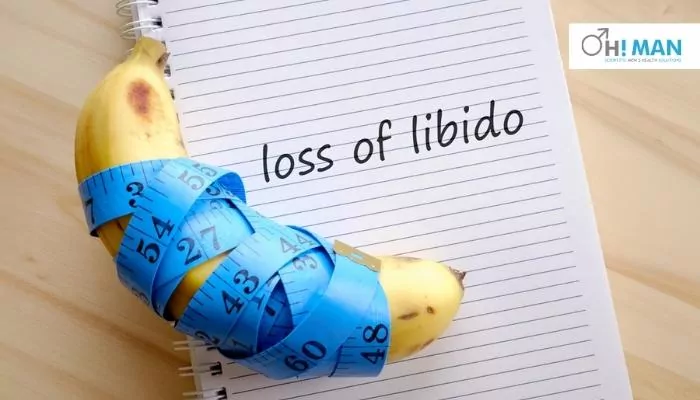Low Libido : Why it Happens? Symptoms, Causes & Treatment
Low Libido : Why it Happens? Symptoms, Causes & Treatment

Low libido, or diminished sexual desire, may affect both genders. It is relatively uncommon for a person’s sexual interest to vary during their life owing to hormonal changes, aging, and stress.
However, low libido may be problematic if it creates stress, impacts a person’s general health, or generates relationship concern. Further, low libido may be caused by underlying medical conditions or lifestyle issues.
People need to understand that sexual desire depends on many factors, such as your physical and emotional health, perceptions, beliefs, way of life, and present relationship. If you have trouble in these aspects, you may experience a lack of sexual desire.
This post will cover everything about male libido, the reason behind the loss of libido, the symptoms, and the various treatment alternatives available.
Understanding Low Libido
Low libido refers to a diminished desire for sexual activity.
Sometimes, it is normal to lose the desire for sex, and libido levels fluctuate throughout life and your sex interests may differ from your companion.
However, prolonged reduced libido may cause worry for specific individuals, and it is occasionally a sign of an underlying health problem.
Table of Content –
Symptoms Of Low Libido In Men
Lox sex drive is associated with hypogonadism, wherein the sex glands produce little sex hormones. In men, the testes are responsible for producing the sex hormone called testosterone. However, in the case of hypogonadism, there is low testosterone production. So apart from experiencing a lack of sexual desire, some other symptoms may include:
- Fatigue
- Difficulties in concentration
- Muscle loss
- Gynecomastia or enlarged breasts
- Infertility resulting due to low sperm count
- Erectile Dysfunction
Low Libido Causes

Low Libido In Men Causes
Here are some causes of lack of sexual desire in men.
1. Physical or Lifestyle Factors
There seem to be lifestyle variables that may substantially contribute to men’s decreased libido. Changing or ceasing the activity is usually the most effective remedy for these.
Some of such reasons causing low libido in men include:
- Drug & Alcohol abuse: Heavy or long-term alcohol use might lower testosterone levels.
- Excessive/Absence of physical activity: Frequent and intense exercise reduces libido. Further, insufficient physical activity may also lead to a lack of libido in many ways.
- Obesity: Excess weight directly impairs metabolic and hormonal functioning, leading to a substantial decrease in total and free testosterone. Fitness and weight reduction, in contrast, boost not only mood and energy levels but also sexual performance and self-image.
- Smoking: Smoking raises the incidence of erectile dysfunction and indirectly decreases sex drive.
2. Psychological
Depression:
Depression and decreased libido would go hand-in-hand. Furthermore, although antidepressants may successfully cure depression, they might worsen difficulties with sexual desire. If you are presently on antidepressants and noticing a diminished sex desire, you may want to speak to your physician about reducing your dosage.
Chronic Illness:
The pain and exhaustion induced by the chronic disease may result in low libido in men. This may be particularly true for the aforementioned chronic illnesses and conditions:
- Arthritis
- Cancer
- Heart disease
- Diabetes
- Fibromyalgia
Whenever it concerns chronic disease and lack of libido, there is seldom a clear line between origin and therapy. Chronic disease may significantly interfere with neurological, hormonal, or circulatory activities fundamental to male sexual desire.
Moreover, the drugs for treating chronic disease (like chemotherapy or cardiovascular treatments) may directly impact the male libido. It may be challenging to determine the reason for the loss of libido and find a solution.
Stress
Stress induces cortisol release, a hormone that operates much like a body’s built-in warning system. Cortisol affects the narrowing of blood vessels, leading to ED, and may also induce a dramatic decline in testosterone.
3. Medication
Certain drugs may result in low libido. These may comprise whole classes of medications with variable effects on a man’s libido. Notable culprits include:
- Antidepressants
- Anticonvulsants
- Beta-blockers
- Antipsychotics
- Statins
- Benzodiazepines
Quitting or modifying the medicine may improve the condition, but not always. Adjusting the dosage may help, yet always consult your doctor before changing medication or dose.
4. Hormone
Rarely low testosterone levels cause erectile dysfunction, and however, low testosterone may affect sexual activity in various ways. Several men with low testosterone notice a decline in libido, whereas others lose all desire for sexual activity. Low testosterone may be caused by testicular damage, past chemotherapy or radiotherapy, anabolic steroid usage, certain drugs, and chronic sickness. in some cases a formation of male menopause.
5. Relationship
Relationship issues, such as a lack of trust, disagreement, and poor communication, may contribute to a lack of sexual desire in men.
Low Libido Causes In Women
Here are the causes of low libido in women.
1. Physical Causes
A wide variety of diseases, physical changes, and drugs may cause decreased libido.
- Sexual issues: If you experience discomfort during sex or cannot climax, your interest in sex may decrease.
- Medical illnesses: Numerous nonsexual conditions, like arthritis, cancer, high blood pressure, diabetes, coronary artery disease, and neurological disorders, may impact sexual desire.
- Lifestyle choices: A glass of red wine may enhance your mood, but consuming too much alcohol might diminish your sexual desire. Further, the same holds for illicit substances. In addition, smoking reduces blood flow, which might reduce arousal.
- Surgery: Any mammary or genital procedure might influence your body shape, sexual function, and desire to engage.
- Fatigue: The exhaustion associated with caring for small children or elderly parents might reduce a person’s sexual desire. Low sex desire may also be caused by sickness or surgery-induced fatigue.
2. Psychological
Your mental condition might influence your sexual desire. There are several psychological explanations for poor sexual desire, such as:
- Mental health issues, including anxiety and sadness
- Strain, such as financial or occupational strain
- Strain, such as financial or occupational strain
- Low self-esteem
- childhood sexual or physical assault
- Previous unpleasant sexual encounters
3. Medication
Similar to men, some drugs may lower sexual desire in women. These medications may include selective serotonin reuptake inhibitors or other antidepressants may lead to low sexual drive.
4. Hormone
- Menopause: In the journey to menopause, estrogen levels decline and Hyperprolactinemia. So this may decrease sexual desire and lead to dry vaginal tissues, leading to painful or unpleasant sexual activity. Even though many women continue to have pleasurable sex after menopause and even beyond, others feel a diminished libido throughout this hormonal transition.
- Pregnancy and nursing: Differences in hormone levels throughout pregnancy, shortly after childbirth, and breast-feeding might decrease sexual desire. Fatigue, modifications in body image, and the stresses of childbirth or looking for a newborn may all contribute to variations in sexual desire.
5. Relationship
For several women, emotional connection is a necessity for sexual interaction. Further, relationship issues may also be a significant cause of reduced sex desire. Frequently, low libido in women is the consequence of continuing concerns, such as:
- Absence of relationship with your spouse
- Unresolved disputes or conflicts
- Inadequate sexual requirements and preferences communicating
- Trust problems
Low Libido Treatment
The treatment of libido involves identifying the underlying cause and then prescribing the right medication or treatment approach.
For instance, a physician may suggest modifying a drug that creates sex-related adverse effects or addressing any underlying health disorders that diminish the person’s sexual desire.
Changing one’s lifestyle may help individuals restore the lack of sexual desire. So eating a good diet, getting adequate sleep, lowering or eliminating alcohol use, and weight loss may help enhance a person’s libido and general health. These treatments may assist an individual in focusing on enjoyment and involvement and reducing unpleasant sexual thoughts.
Hormonal Treatment For Lack Of Libido
A doctor may give estrogen treatment to women with reduced libido due to menopause or other hormonal factors. However, studies have not yet confirmed its efficacy for this ailment.
The low libido medication or the Systemic estrogen therapy refers to a pill that boosts estrogen levels throughout the body. Further, topical estrogen, which may be a lotion or vaginal ring, treats vaginal problems, including dryness. Hormone therapy might have adverse effects, and therefore it is recommended to see a physician before beginning treatment.
The doctor may prescribe testosterone replacement therapy for low libido in men with low testosterone. So this drug may be administered as patches or injections.
Bottom Line
If low libido significantly impacts a person’s life, they must see a specialist. Further, some persons with low libido may experience increased stress, negatively impacting their emotional wellbeing. Further, low sex desire should not bring embarrassment when discussed, and it is a frequent occurrence that may be a sign or side effect of several circumstances.
A physician may assist a patient in working through the issue and discovering an appropriate therapy, or they can send the patient to an expert in sexual health.
At Ohman, our specialists can effectively address your concern and focus on treating the condition contributing to a lack of sexual desire. After consulting our doctors, the doctors may prescribe you Sildenafil, PDE5 or Tadalafil to treat your condition. Or else, there are herbal options available like Shilajit & Herb tablets, when combined with lifestyle changes, which may offer a great result. However, the medication prescribing depends on detailed examination of your past and current medical condition.
Ohman offers both natural and allopathic options to treat libido loss. So with the help of experienced doctors, we have curated various medication bundles that might help you bring back your lost sexual desire and help you perform better. Some of these ayurvedic option include:
- All Natural Performance Enhancing Pack
- All Natural Last Long Pack
- Korean Red Ginseng
- Ayur Vertility Pack
- Herb Mix Tablets
- Libido Booster Pack
- Date Night Essentials Pack
And some of the Best Allopathic Medicines for Low Libido & erections-
All these packs or bundles are a combined package that meets the various needs of various individuals. So you can book an online consultation with our experts and order any of these medications through our platform.



